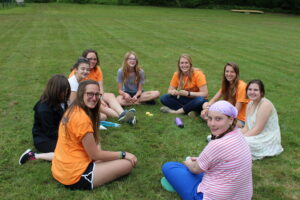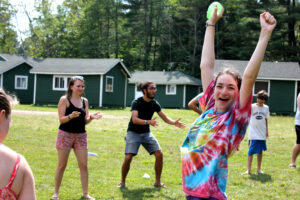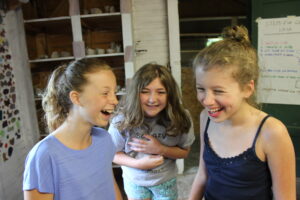
An important note before moving on to the rest of this post:
Akeela is a community that prides itself, above all else, on being welcoming to everyone. Our whole purpose is to provide a space where “quirky” kids can be themselves, surrounded by peers and counselors who don’t just accept them for who they are, but who adore them just the way they are. That core belief extends beyond neurodiversity to include all forms of diversity, including gender. Many of our campers identify beyond the binary and it goes without saying that they are integral and thriving members of our camp community. While we are currently discussing gender-inclusive housing for upcoming summers, Akeela has to date offered “boys cabins” and “girls cabins”. It is with that binary housing framework in mind that we explore the topic of neurodiversity and gender in this blog post.
Since its inception, Camp Akeela has always been very intentional about creating a coed community. That may have something to do with Eric’s own experiences as a camper. His first overnight camp, which he attended for three summers, was an all-boys camp. There was a sister camp a few miles away and the only times the two camps mixed were at weekly “socials”. These events were not Eric’s forte; they felt forced and awkward. There was peer pressure to make an impression on the girls, but no opportunity to really get to know any of them as friends. When he was 12, Eric started attending a different camp, and he stayed there for 12 summers! It was a coed camp that had as one of its founding principles the idea that boys and girls should develop natural friendships through shared experiences. There were no socials; instead, campers swam, hiked, ate, and played together every day. The results were just as that camp’s founders intended: Eric developed as many lifelong friendships with girls as he did with the boys in his cabin.

When creating Camp Akeela, we shared the philosophy of Eric’s second childhood camp. It was really important to us, from the perspective of camp culture, to remove any potential barriers between potential friends at camp. We wanted to make it as easy as possible for campers to have friendships wherever they organically developed in the Akeela community. We were also told by many parents who were signing up for camp that their children tended to get along better with kids who didn’t share their gender and/or who were of a different age.
All of that is to say that we always wanted Akeela to have as close to a one-to-one ratio of boys to girls as possible. It turns out that was easier said than done! To the extent that many of our families find us through their child’s diagnosis of Asperger’s or ASD, we have always received more phone calls from parents of boys than parents of girls. Indeed, as recently as 2022, it was estimated that ASD was diagnosed three to four times more often in boys than in girls.
As an aside, there is quite a bit of excellent literature out there about why this imbalance exists. A quick Google search turned up these results on the first page:
Why Many Autistic Girls Are Overlooked: They often go undiagnosed because they don’t fit autism stereotypes and they mask symptoms better than boys do.
Written by Beth Arky and published by the Child Mind Institute,
Autism Is Underdiagnosed In Girls and Women
Written by Karen Saporito, published by Psychology Today on February 3, 2022
Are Girl With Autism Hiding In Plain Sight?
https://sparkforautism.org/discover_article/are-girls-with-autism-hiding-in-plain-sight/
Written by Marina Sarris, published by SPARK, February 14, 2023
As we said in our most recent camp newsletter (https://campakeela.com/akeela-newsletter-february-2023/), we are starting to see a marked increase in the number of girls applying to Camp Akeela. This is a trend that we are thrilled about – both because expect to have more female-identifying campers in 2023 than ever before and because it indicates that girls are starting to receive the diagnoses and support that they deserve!




 Check out
Check out
Exploring the intersection of neurodiversity and gender, this article sheds light on the unique experiences and challenges faced by neurodivergent individuals within the context of gender identity and expression. It emphasizes the importance of recognizing and celebrating neurodivergent individuals’ diverse gender identities, promoting inclusivity, and providing support for their specific needs. Thank you for raising awareness about this important topic and fostering a more inclusive understanding of neurodiversity!
Once again, Camp Akeela sets the example that can be a light for all of us. Not only do they lead with understanding and compassion, they boldly live the values of inclusivity and acceptance that we work to instill in our sons. As we would say in the Marine Corps, outstanding!